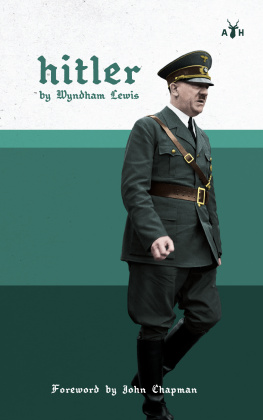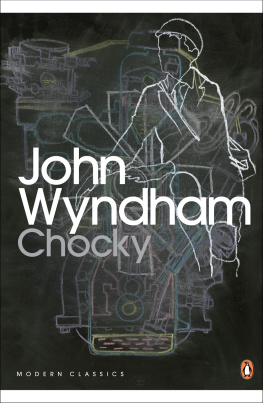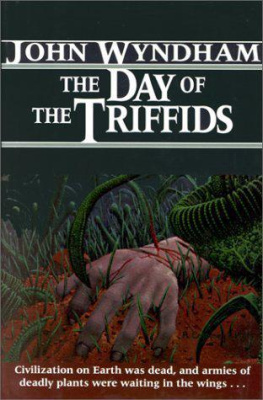Wyndham Lewis - America and Cosmic Man
Here you can read online Wyndham Lewis - America and Cosmic Man full text of the book (entire story) in english for free. Download pdf and epub, get meaning, cover and reviews about this ebook. year: 2006, publisher: Kessinger Publishing, genre: Politics. Description of the work, (preface) as well as reviews are available. Best literature library LitArk.com created for fans of good reading and offers a wide selection of genres:
Romance novel
Science fiction
Adventure
Detective
Science
History
Home and family
Prose
Art
Politics
Computer
Non-fiction
Religion
Business
Children
Humor
Choose a favorite category and find really read worthwhile books. Enjoy immersion in the world of imagination, feel the emotions of the characters or learn something new for yourself, make an fascinating discovery.

- Book:America and Cosmic Man
- Author:
- Publisher:Kessinger Publishing
- Genre:
- Year:2006
- Rating:4 / 5
- Favourites:Add to favourites
- Your mark:
- 80
- 1
- 2
- 3
- 4
- 5
America and Cosmic Man: summary, description and annotation
We offer to read an annotation, description, summary or preface (depends on what the author of the book "America and Cosmic Man" wrote himself). If you haven't found the necessary information about the book — write in the comments, we will try to find it.
America and Cosmic Man — read online for free the complete book (whole text) full work
Below is the text of the book, divided by pages. System saving the place of the last page read, allows you to conveniently read the book "America and Cosmic Man" online for free, without having to search again every time where you left off. Put a bookmark, and you can go to the page where you finished reading at any time.
Font size:
Interval:
Bookmark:
I do not see how England and America as nations can ever have a very close understanding, the incompatibilities are too numerous. Both have what might be called the champion- complex. Bossiness is not extinct in the English, and the average little American derives much satisfaction, still, from the bigness of the U.S.A. Purely as competing nations, and until that type of relationship is superseded by something more intelligent, it is a waste of time to "explain" them to each other with a view to establishing an entente. I commit myself to this expression of opinion lest people at the start suppose I am engaged upon some good-will mission, which is not the case.
I am not here to sell America to you. But I should like to sell something that is to be found there, and not here in Britain, that is very impressive: so much so that once you have grasped what it means, it must affect profoundly your outlook. For my own partensuing upon travel in "those United States" which never seemed to have an endit will influence everything I think and write henceforth. It has tended to transform me from a good European into an excellent internationalist.
In writing of America one has of course to remind oneself how intimately the American is now known to the inhabitants of these islands. He is known in all his varieties: Hoosier, New Yorker, Texan, demi-Mexican, and high-yellowlittle gentleman from "Harvard," and little thief just out of a penitentiary. But he is known in a military disguise, far from his habitat, under conditions calculated to bring out all that is most irritating in the American.
The presence of great numbers of United States troops in England for so long a period, it is better to admit, has not been politically helpful. Such contacts rarely prove to be that, especially where one set of people is so much better supplied with cash than the other and is not exactly disposed to conceal the fact, or the less fortunate inclined to be philosophic regarding his economic inferiority.
So on the more primitive levels mass-contact has left in the main antagonism, though do not let us exaggerate. The popular Press does not diminish this by its reports, in which the United States figures as an economic bully, ordering Great Britain about; when she's in Carey Street, as she is today, refusing to lend her money, and at the same time scolding British miners for not working hard enough. Politics is a melodrama for teen-aged minds: America has not le beau role over here, and the British are the invariable recipients of a bucket of dirty water or a derisive howl in the silly old thriller as played by any American, whoever he may be. Who, for instance, were these words written by? (I take them from a book review.) "We broke away from the English and beat them and sent them back to their island; and they have never forgiven this." By Mr. Edmund Wilson. That garish jingo lining to quite a worldly little bag of tricks is typical.
In a mild way it is a case of cat and dog, for neither English nor American has a monopoly of prejudice, and I have seen Englishmen considerably more intelligent than Mr. Wilson display just as raw a chauvinism. On both sides this indicates the "big-shot" complex, which is of course a pity. It manifests the sublimest indifference to history, this applying, if anything, rather more to the English than to the American.
Toward America the English stand in a very special relationship. Its birth as a Whig baby (unnaturally large) in the eighteenth century induced in us formerly feelings of rather quizzical parenthood. But, like babies, and other things, in the pages of Alice in Wonderland, as we gazed at it across the Atlantic this baby changed. It was still a baby, it continued to express itself in English, but it took on a more swarthy complexion, and it became obvious it was no longer in the main our child.
The fact, however, that America and England have a common tongue, that their respective institutions derive from a common source, and that in the past they were so closely related by blood, and have innumerable ties, historically, morally, and intellectually, means that America is for us theoretically in a class all by itself among states.
In another way it has played a very profound part in our life as a nation. The influence America has exerted all along upon England is enormous; a fact that is generally forgotten. England would not be the place it is today had there been no America. Almost certainly there would be no social-democratic government at this timeno Mr. Attlee or Mr. Bevinbut some regime such as the Dutch still have, or like that obtaining in Hungary prior to World War I.
When Morley was engaged in refuting Maine's onslaught upon popular government in the 'eighties, he brought out this point very well, tracing the growth of "English Liberalism of a radical democratic type" to the influence of America. "The success of popular government across the Atlantic has been the strongest incentive to the extension of popular government here." To the example of the United States he adds that of the overseas commonwealths. "The success of popular self- government in these thriving communities is reacting on political opinion at home with a force that ... is every day increasing."
It continually increased until Lloyd George's innovations in the field of social insurance went farther along the Liberal road than America had thought of venturing; and today, in beginning the change from private ownership to public ownership of key industries, we have indeed left our great model of "multitudinous government" behind. But the first and most powerful impulses in that direction came from the United States. Without the experience of American prosperity and stability, the English would hardly have broken away from the general belief that no government of the Many can be stable or be conducive to prosperity, or nothing like so soon.
In our broken world there are two great States which remain intact, namely the U.S.A. and the U.S.S.R. These two gigantic nations tower above our famished slums (one of them, paradoxically, itself a slum, almost as ill-fed and ill-clothed as any). For a considerable time to come, these two dominant Powers will, between them, exercise almost complete control over our national life. Consequently what they are is a matter that must invite our anxious attention. I have done my best in these pages to show what one of them, the U.S.A., is, as State and as human organism, in this connection bleakly distinct.
For Russia much less antagonism is felt in Englandpartly, of course, because there is no ruble problem as there is a dollar problem. Yet the popular ecstasies of the war-years are not even a memory, no trace is left at all: Russia is seen now as the perpetual obstructor in peace conferences, and even as a potential war-maker. It is considered by the average Briton that she does not observe the terms of pacts and treaties, and that she has contracted the odious habit of hanging iron curtains around those states she has politically raped and in some cases murdered, or bits of which she has lopped off.
There has been no contact, except between troops. That has had the worst possible effect. English soldiers returned from Austria and Germany, who have lived in daily touch with the Russian soldiery, have not a good word to say for them. An image remains, from the stories they tell, simple in outline, and it never varies: a dirty man at the end of a tommy-gun asking violently for something to which he has no right. (Our man with the property-complex would be just as unsympathetic as viewed by the other.) To set against such adverse pictures, a photograph of "Uncle Joe" with his mustache and his pipe still draws a kindly smile from the newspaper reader.
Font size:
Interval:
Bookmark:
Similar books «America and Cosmic Man»
Look at similar books to America and Cosmic Man. We have selected literature similar in name and meaning in the hope of providing readers with more options to find new, interesting, not yet read works.
Discussion, reviews of the book America and Cosmic Man and just readers' own opinions. Leave your comments, write what you think about the work, its meaning or the main characters. Specify what exactly you liked and what you didn't like, and why you think so.





